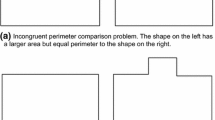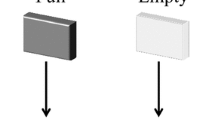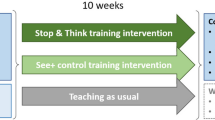Abstract
Many learners often commit systematic errors in mathematics tasks because they rely on heuristics even when they are not applicable. This phenomenon is known as the heuristic bias, and it has been found in children, adolescents, and educated adults. However, it is still unclear whether mathematics teachers are still affected by heuristic biases and whether they still need to inhibit such biases. The present study employed a negative priming paradigm and compared the performance of overcoming heuristic bias among mathematics teachers (N = 32), pre-service mathematics teachers (N = 23), and non-mathematics undergraduate students (N = 43) in the case of overusing proportional heuristics. We found that all the participants were affected by the proportional heuristic bias, and they all demonstrated a cognitive process of inhibition when solving non-proportional problems. Moreover, we found that teachers with many years of teaching experience showed a stronger tendency to overuse proportionality than the other two groups. The present study highlights the importance of teachers’ ability to understand their cognitive processes in teaching practice. The results imply that inhibitory control plays an essential role in both mathematical teaching and learning. Interventions that aim at improving teachers’ metacognition and inhibition ability might be needed in future professional development programs.


Similar content being viewed by others
Notes
Generally, the magnitude of NP effect represents the efficiency of inhibitory control. The smaller magnitude of the NP effect is detected, the greater the efficiency of inhibitory control is observed, and vice versa.
References
Anderson, N., & J. (2002). The role of metacognition in second language teaching and learning. In ERIC Digest. Washington, DC: ERIC Clearinghouse on Languages and Linguistics.
Babai, R., Levyadun, T., Stavy, R., & Tirosh, D. (2006). Intuitive rules in science and mathematics: A reaction time study. International Journal of Mathematical Education in Science and Technology, 37(8), 913–924. https://doi.org/10.1080/00207390600794958.
Babai, R., Eidelman, R. R., & Stavy, R. (2012). Preactivation of inhibitory control mechanisms hinders intuitive reasoning. International Journal of Science and Mathematics Education, 10(4), 763–775. https://doi.org/10.1007/s10763-011-9287-y.
Babai, R., Younis, N., & Stavy, R. (2014). Involvement of inhibitory control mechanisms in overcoming intuitive interferences. Neuroeducation, 3(1), 1–9. https://doi.org/10.24046/neuroed.20140301.1.
Babai, R., Shalev, E., & Stavy, R. (2015). The effect of a warning intervention on the ability to overcome intuitive interference. Turin: EuroAsianPacific Joint Conference on Cognitive Science.
Bago, B., & De Neys, W. (2017). Fast logic?: Examining the time course assumption of dual process theory. Cognition, 158, 90–109. https://doi.org/10.1016/j.cognition.2016.10.014.
Baier, F., Decker, A. T., Voss, T., Kleickmann, T., Klusmann, U., & Kunter, M. (2019). What makes a good teacher? The relative importance of mathematics teachers' cognitive ability, personality, knowledge, beliefs, and motivation for instructional quality. British Journal of Educational Psychology, 89(4), 767–786. https://doi.org/10.1111/bjep.12256.
Bardach, L., & Klassen, R. M. (2020). Smart teachers, successful students? A systematic review of the literature on teachers' cognitive abilities and teacher effectiveness. Educational Research Review, 30, 100312. https://doi.org/10.1016/j.edurev.2020.100312.
Baumert, J., Kunter, M., Blum, W., Brunner, M., Voss, T., Jordan, A., Klusmann, U., Krauss, S., Neubrand, M., & Tsai, Y.-M. (2010). Teachers’ mathematical knowledge, cognitive activation in the classroom, and student progress. American Educational Research Journal, 47(1), 133–180. https://doi.org/10.3102/0002831209345157.
Baylor, A. L. (2002). Expanding pre-service teachers' metacognitive awareness of instructional planning through pedagogical agents. Educational Technology Research and Development, 50(2), 5–22. https://doi.org/10.1007/Bf02504991.
Beijing Normal University Press. (2013). Compulsory education curriculum standard experimental textbook Mathematics [义务教育课程标准实验教科书 数学] (Vol. 49). Beijing Normal University press.
Borko, H., & Livingston, C. (1989). Cognition and improvisation: Differences in mathematics instruction by expert and novice teachers. American Educational Research Journal, 26(4), 473–498. https://doi.org/10.2307/1162861.
Borst, G., Moutier, S., & Houdé, O. (2013). Negative priming in logicomathematical reasoning: The cost of blocking your intuition. In M. O. Wim De Neys (Ed.), New Approaches in Reasoning Research (pp. 34–50). London & New York: Psychology Press.
Borst, G., Poirel, N., Pineau, A., Cassotti, M., & Houdé, O. (2013b). Inhibitory control efficiency in a Piaget-like class-inclusion task in school-age children and adults: A developmental negative priming study. Developmental Psychology, 49(7), 1366–1374. https://doi.org/10.1037/a0029622.
Camarda, A., Borst, G., Agogué, M., Habib, M., Weil, B., Houdé, O., & Cassotti, M. (2017). Do we need inhibitory control to be creative? Evidence from a dual-task paradigm. Psychology of Aesthetics, Creativity, and the Arts, 12(3), 351–358. https://doi.org/10.1037/aca0000140.
Cassotti, M., & Moutier, S. (2010). How to explain receptivity to conjunction-fallacy inhibition training: Evidence from the Iowa gambling task. Brain and Cognition, 72(3), 378–384. https://doi.org/10.1016/j.bandc.2009.11.004.
Curwen, M. S., Miller, R. G., White-Smith, K. A., & Calfee, R. C. (2010). Increasing teachers' metacognition develops students' higher learning during content area literacy instruction: Findings from the read-write cycle project. Issues in Teacher Education, 19(2), 127–151.
De Bock, D., Van Dooren, W., Janssens, D., & Verschaffel, L. (2007). The illusion of linearity: From analysis to improvement. New York, NY: Springer.
De Neys, W. (2012). Bias and conflict: A case for logical intuitions. Perspectives on Psychological Science, 7(1), 28–38. https://doi.org/10.1177/1745691611429354.
De Neys, W. (2013). Conflict detection, dual processes, and logical intuitions: Some clarifications. Thinking & Reasoning, 20(2), 169–187. https://doi.org/10.1080/13546783.2013.854725.
Diamond, A. (2013). Executive functions. Annual Review of Psychology, 64(1), 135–168. https://doi.org/10.1146/annurev-psych-113011-143750.
Evans, J. S. B. (2006). The heuristic-analytic theory of reasoning: Extension and evaluation. Psychonomic Bulletin & Review, 13(3), 378–395. https://doi.org/10.3758/bf03193858.
Evans, J. S. B., & Stanovich, K. E. (2013). Dual-process theories of higher cognition: Advancing the debate. Perspectives on Psychological Science, 8(3), 223–241. https://doi.org/10.1177/1745691612460685.
Faul, F., Erdfelder, E., Lang, A.-G., & Buchner, A. (2007). G* power 3: A flexible statistical power analysis program for the social, behavioral, and biomedical sciences. Behavior Research Methods, 39(2), 175–191.
Fernández, C., Llinares, S., Van Dooren, W., De Bock, D., & Verschaffel, L. (2011). Effect of number structure and nature of quantities on secondary school students’ proportional reasoning. Studia Psychologica, 53(1), 69–81 <go to ISI>://WOS:000289660600006.
Fernández, C., Llinares, S., Van Dooren, W., De Bock, D., & Verschaffel, L. (2012). The development of students' use of additive and proportional methods along primary and secondary school. European Journal of Psychology of Education, 27(3), 421–438. https://doi.org/10.1007/s10212-011-0087-0.
Fernández, C., De Bock, D., Verschaffel, L., & Van Dooren, W. (2014). Do students confuse dimensionality and “directionality”? The Journal of Mathematical Behavior, 36, 166–176. https://doi.org/10.1016/j.jmathb.2014.07.001.
Filloy, E., & Sutherland, R. (1996). Designing curricula for teaching and learning algebra. In A. J. Bishop, K. Clements, C. Keitel, J. Kilpatrick, & C. Laborde (Eds.), International handbook of mathematics education (pp. 139–160). Springer. https://doi.org/10.1007/978-94-009-1465-0.
Fu, X., & Li, X. (2017). Cognitive inhibition: A new perspective on problem solving. Journal of Psychological Science [心理科学], 40(1), 58–63.
Gigerenzer, G., & Gaissmaier, W. (2011). Heuristic decision making. Annual Review of Psychology, 62, 451–482. https://doi.org/10.1146/annurev-psych-120709-145346.
Gillard, E., Van Dooren, W., Schaeken, W., & Verschaffel, L. (2009). Proportional reasoning as a heuristic-based process: Time constraint and dual task considerations. Experimental Psychology, 56(2), 92–99. https://doi.org/10.1027/1618-3169.56.2.92.
Greer, B. (2009). Helping children develop mathematically. Human Development, 52(2), 148–161. https://doi.org/10.1159/000202731.
Gregoire, M. (2003). Is it a challenge or a threat? A dual-process model of teachers’ cognition and appraisal processes during conceptual change. Educational Psychology Review, 15(2), 147–179. https://doi.org/10.1023/A:1023477131081.
Hilbig, B. E., & Pohl, R. F. (2009). Ignorance- versus evidence-based decision making: A decision time analysis of the recognition heuristic. Journal of Experimental Psychology: Learning, Memory, and Cognition, 35(5), 1296–1305. https://doi.org/10.1037/a0016565.
Hoch, S., Reinhold, F., & Strohmaier, A. (2018). The possibility to use benchmarking strategies speeds up adults’ response times in fraction comparison tasks. In F. D. d. M. d. U. Paderborn (Ed.), Beiträge zum Mathematikunterricht 2018 (pp. 795–798). München: WTM-Verlag.
Houdé, O., & Borst, G. (2014). Measuring inhibitory control in children and adults: Brain imaging and mental chronometry. Frontiers in Psychology, 5(616), 616. https://doi.org/10.3389/fpsyg.2014.00616.
Houdé, O., & Borst, G. (2015). Evidence for an inhibitory-control theory of the reasoning brain. Frontiers in Human Neuroscience, 9, 148. https://doi.org/10.3389/fnhum.2015.00148.
Houdé, O., & Guichart, E. (2001). Negative priming effect after inhibition of number/length interference in a Piaget-like task. Developmental Science, 4(1), 119–123. https://doi.org/10.1111/1467-7687.00156.
Jiang, R., & Li, X. (2017). The overuse of proportional reasoning and its cognitive mechanism: A developmental negative priming study. Acta Psychologica Sinica[心理学报], 49(06), 745–758.
Jiang, R., Li, X., Fernández, C., & Fu, X. (2017). Students' performance on missing-value word problems: A cross-national developmental study. European Journal of Psychology of Education, 32(4), 551–570. https://doi.org/10.1007/s10212-016-0322-9.
Jiang, R., Li, X., Xu, P., & Chen, Y. (2019a). Inhibiting intuitive rules in a geometry comparison task: Do age level and math achievement matter? Journal of Experimental Child Psychology, 186, 1–16. https://doi.org/10.1016/j.jecp.2019.05.003.
Jiang, R., Li, X., Xu, P., Zhong, L., & Lei, Y. (2019b). The role of inhibitory control in overcoming English written-verb inflection errors: Evidence from Chinese ESL learners. Current Psychology, 1–11. https://doi.org/10.1007/s12144-019-00482-9.
Jiang, R., Li, X., Xu, P., & Mao, T. (2020). Why students are biased by heuristics: Examining the role of inhibitory control, conflict detection, and working memory in the case of overusing proportionality. Cognitive Development, 53, 100850. https://doi.org/10.1016/j.cogdev.2020.100850.
Krauss, S., Baumert, J., & Blum, W. (2008a). Secondary mathematics teachers' pedagogical content knowledge and content knowledge: Validation of the COACTIV constructs. ZDM, 40(5), 873–892. https://doi.org/10.1007/s11858-008-0141-9.
Krauss, S., Brunner, M., Kunter, M., Baumert, J., Blum, W., Neubrand, M., & Jordan, A. (2008b). Pedagogical content knowledge and content knowledge of secondary mathematics teachers. Journal of Educational Psychology, 100(3), 716–725. https://doi.org/10.1037/0022-0663.100.3.716.
Lanoë, C., Vidal, J., Lubin, A., Houdé, O., & Borst, G. (2016). Inhibitory control is needed to overcome written verb inflection errors: Evidence from a developmental negative priming study. Cognitive Development, 37, 18–27. https://doi.org/10.1016/j.cogdev.2015.10.005.
Lesh, R., Post, T., & Behr, M. (1988). Proportional reasoning. In H. James & M. Behr (Eds.), Number concepts and operations in the middle grades (pp. 93–118). Reston, VA: National Council of Teachers of Mathematics
Li, X., Jiang, R., & Qian, Y. (2014). 5-8 graders’ overuse of proportionality on missing-value problems. Journal of Mathematics Education [数学教育学报], 23(6), 73–77.
Lubin, A., Vidal, J., Lanoë, C., Houdé, O., & Borst, G. (2013). Inhibitory control is needed for the resolution of arithmetic word problems: A developmental negative priming study. Journal of Educational Psychology, 105(3), 701–708. https://doi.org/10.1037/a0032625.
Lubin, A., Rossi, S., Lanoë, C., Vidal, J., Houdé, O., & Borst, G. (2016). Expertise, inhibitory control and arithmetic word problems: A negative priming study in mathematics experts. Learning and Instruction, 45, 40–48. https://doi.org/10.1016/j.learninstruc.2016.06.004.
Martínez Ortiz, A. (2015). Examining students’ proportional reasoning strategy levels as evidence of the impact of an integrated LEGO robotics and mathematics learning experience. Journal of Technology Education, 26(2), 46–69. https://doi.org/10.21061/jte.v26i2.a.3.
Masson, S., Potvin, P., Riopel, M., & Foisy, L. M. B. (2014). Differences in brain activation between novices and experts in science during a task involving a common misconception in electricity. Mind, Brain, and Education, 8(1), 44–55. https://doi.org/10.1111/mbe.12043.
Meert, G., Grégoire, J., & Noël, M.-P. (2010). Comparing the magnitude of two fractions with common components: Which representations are used by 10-and 12-year-olds? Journal of Experimental Child Psychology, 107(3), 244–259. https://doi.org/10.1016/j.jecp.2010.04.008.
Mewborn, D. S. (1999). Reflective thinking among pre-service elementary mathematics teachers. Journal for Research in Mathematics Education, 30(3), 316–341. https://doi.org/10.2307/749838.
Moutier, S., & Houdé, O. (2003). Judgement under uncertainty and conjunction fallacy inhibition training. Thinking & Reasoning, 9(3), 185–201. https://doi.org/10.1080/13546780343000213.
Obersteiner, A., Van Dooren, W., Van Hoof, J., & Verschaffel, L. (2013). The natural number bias and magnitude representation in fraction comparison by expert mathematicians. Learning and Instruction, 28, 64–72. https://doi.org/10.1016/j.learninstruc.2013.05.003.
Obersteiner, A., Hoof, J. V., Verschaffel, L., & Dooren, W. V. (2016). Who can escape the natural number bias in rational number tasks? A study involving students and experts. British Journal of Psychology, 107(3), 537–555. https://doi.org/10.1111/bjop.12161.
Osman, M., & Stavy, R. (2006). Development of intuitive rules: Evaluating the application of the dual-system framework to understanding children’s intuitive reasoning. Psychonomic Bulletin & Review, 13(6), 935–953. https://doi.org/10.3758/BF03213907.
Posthuma, B. (2012). Mathematics teachers' reflective practice within the context of adapted lesson study. Pythagoras, 33(3), 1–9. https://doi.org/10.4102/pythagoras.v33i3.140.
Roell, M., Viarouge, A., Houdé, O., & Borst, G. (2017). Inhibitory control and decimal number comparison in school-aged children. PLoS One, 12(11), e0188276. https://doi.org/10.1371/journal.pone.0188276.
Stanovich, K. E. (2018). Miserliness in human cognition: The interaction of detection, override and mindware. Thinking & Reasoning, 24(4), 1–22. https://doi.org/10.1080/13546783.2018.1459314.
Tipper, S. P. (1985). The negative priming effect: Inhibitory priming by ignored objects. The Quarterly Journal of Experimental Psychology, 37(4), 571–590. https://doi.org/10.1080/14640748508400920.
Tipper, S. P. (2001). Does negative priming reflect inhibitory mechanisms? A review and integration of conflicting views. Quarterly Journal of Experimental Psychology A Human Experimental Psychology, 54(2), 321–343. https://doi.org/10.1080/713755969.
Torenbeek, M. (2015). Using heuristics in solving arithmetic word problems: An advantage or disadvantage? (Master thesis), Leiden University.
Vamvakoussi, X., Van Dooren, W., & Verschaffel, L. (2012). Naturally biased? In search for reaction time evidence for a natural number bias in adults. The Journal of Mathematical Behavior, 31(3), 344–355. https://doi.org/10.1016/j.jmathb.2012.02.001.
Van Dooren, W., De Bock, D., Depaepe, F., Janssens, D., & Verschaffel, L. (2003a). The illusion of linearity: Expanding the evidence towards probabilistic reasoning. Educational Studies in Mathematics, 53(2), 113–138. https://doi.org/10.1023/A:1025516816886.
Van Dooren, W., Verschaffel, L., & Onghena, P. (2003b). Pre-service teachers' preferred strategies for solving arithmetic and algebra word problems. Journal of Mathematics Teacher Education, 6(1), 27–52. https://doi.org/10.1023/A:1022109006658.
Van Dooren, W., De Bock, D., Hessels, A., Janssens, D., & Verschaffel, L. (2005). Not everything is proportional: Effects of age and problem type on propensities for overgeneralization. Cognition & Instruction, 23(1), 57–86. https://doi.org/10.1207/s1532690xci2301_3.
Van Dooren, W., De Bock, D., Evers, M., & Verschaffel, L. (2009). Students’ overuse of proportionality on missing-value problems: How numbers may change solutions. Journal for Research in Mathematics Education, 187–211. Retrieved from https://www.jstor.org/stable/40539331. Accessed 8 Aug 2020.
Villarreal, M., EsteleyII, C., & AlagiaIII, H. (2004). University students’ extension of linear models to non-linear situations. Paper presented at the Proceedings of the 28th Conference of the International Group for the Psychology of Mathematics Education, Bergen, Norway.
Wilson, N. S., & Bai, H. (2010). The relationships and impact of teachers' metacognitive knowledge and pedagogical understandings of metacognition. Metacognition and Learning, 5(3), 269–288. https://doi.org/10.1007/s11409-010-9062-4.
Acknowledgements
This manuscript was supported by a grant from the Chinese National Office of Education Sciences Planning (BBA170062). We thank the mathematics teachers for their valuable help with data collection and the students for participating.
Author information
Authors and Affiliations
Corresponding author
Ethics declarations
Conflict of Interest
On behalf of all authors, the corresponding author states that there is no conflict of interest.
Additional information
Publisher’s Note
Springer Nature remains neutral with regard to jurisdictional claims in published maps and institutional affiliations.
Rights and permissions
About this article
Cite this article
Jiang, R., Li, X., Xu, P. et al. Do teachers need to inhibit heuristic Bias in mathematics problem-solving? Evidence from a negative-priming study. Curr Psychol 41, 6954–6965 (2022). https://doi.org/10.1007/s12144-020-01209-x
Accepted:
Published:
Issue Date:
DOI: https://doi.org/10.1007/s12144-020-01209-x




